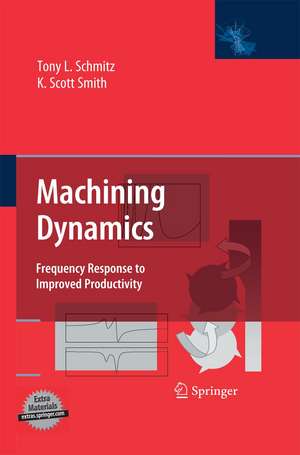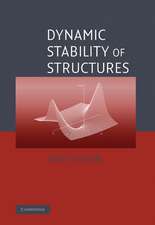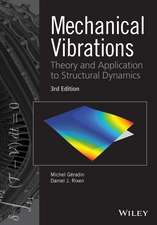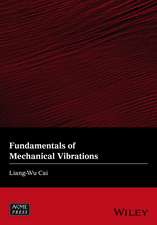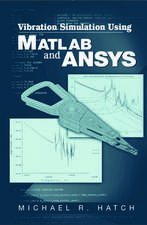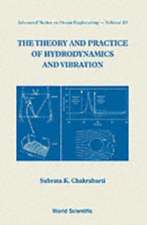Machining Dynamics: Frequency Response to Improved Productivity
Autor Tony L. Schmitz, K. Scott Smithen Limba Engleză Paperback – 19 aug 2014
The following topics are covered in detail: modal analysis, including experimental methods, to obtain the tool point frequency response function; descriptions of turning and milling, including force modeling, time domain simulation, stability lobe diagram algorithms, and surface location error calculation for milling; and receptance coupling methods for tool point frequency response prediction, including beam theory. Numerical examples are included, as well as the MATLAB code used to develop the figures.
| Toate formatele și edițiile | Preț | Express |
|---|---|---|
| Paperback (2) | 731.28 lei 6-8 săpt. | |
| Springer International Publishing – 3 ian 2019 | 731.28 lei 6-8 săpt. | |
| Springer Us – 19 aug 2014 | 891.17 lei 6-8 săpt. | |
| Hardback (1) | 1119.52 lei 6-8 săpt. | |
| Springer International Publishing – 9 noi 2018 | 1119.52 lei 6-8 săpt. |
Preț: 891.17 lei
Preț vechi: 1086.79 lei
-18% Nou
Puncte Express: 1337
Preț estimativ în valută:
170.53€ • 182.35$ • 142.18£
170.53€ • 182.35$ • 142.18£
Carte tipărită la comandă
Livrare economică 18 aprilie-02 mai
Preluare comenzi: 021 569.72.76
Specificații
ISBN-13: 9781461499381
ISBN-10: 1461499380
Pagini: 320
Ilustrații: XI, 304 p.
Dimensiuni: 155 x 235 x 17 mm
Greutate: 0.45 kg
Ediția:2009
Editura: Springer Us
Colecția Springer
Locul publicării:New York, NY, United States
ISBN-10: 1461499380
Pagini: 320
Ilustrații: XI, 304 p.
Dimensiuni: 155 x 235 x 17 mm
Greutate: 0.45 kg
Ediția:2009
Editura: Springer Us
Colecția Springer
Locul publicării:New York, NY, United States
Public țintă
Professional/practitionerCuprins
Modal Analysis.- Turning Dynamics.- Milling Dynamics.- Surface Location Error in Milling.- Special Topics in Milling.- Tool Point Dynamics Prediction.
Textul de pe ultima copertă
Machining Dynamics: From frequency response to improved productivity will train engineers and students in the practical application of machining dynamics, with a particular focus on milling. The book is arranged such that the steps required to improve machining productivity through chatter avoidance and reduced surface location error (forced vibrations resulting in part geometric errors) are clearly evident. The following topics are covered in detail: modal analysis, including experimental methods, to obtain the tool point frequency response function; descriptions of turning and milling, including force modeling, time domain simulation, stability lobe diagram algorithms, and surface location error calculation for milling; and receptance coupling methods for tool point frequency response prediction, including beam theory.
Readers will find:
clear descriptions of predictive algorithms for machining process performance
comprehensive coverage of the fundamentals of machining dynamics
numerous numerical examples
functional MATLAB® code for process predictions.
Machining dynamics: From frequency response to improved productivity will serve as a valuable resource for practicing manufacturing engineers and graduate students interested in learning how to improve machining productivity through consideration of the process dynamics.
Readers will find:
clear descriptions of predictive algorithms for machining process performance
comprehensive coverage of the fundamentals of machining dynamics
numerous numerical examples
functional MATLAB® code for process predictions.
Machining dynamics: From frequency response to improved productivity will serve as a valuable resource for practicing manufacturing engineers and graduate students interested in learning how to improve machining productivity through consideration of the process dynamics.
Caracteristici
Provides a clear description of predictive algorithms for process performance Provides the necessary information in a manner that enables rapid implementation Offers a comprehensive source of the fundamentals of machining dynamics that leads to reduced reliance on handbooks and rules of thumb Includes functional MATLAB code for process predictions
Notă biografică
Tony L. Schmitz is Professor of Mechanical Engineering and Engineering Science at The University of North Carolina at Charlotte.
K. Scott Smith is Professor and Department Chair of Mechanical Engineering and Engineering Science at The University of North Carolina at Charlotte.
K. Scott Smith is Professor and Department Chair of Mechanical Engineering and Engineering Science at The University of North Carolina at Charlotte.
